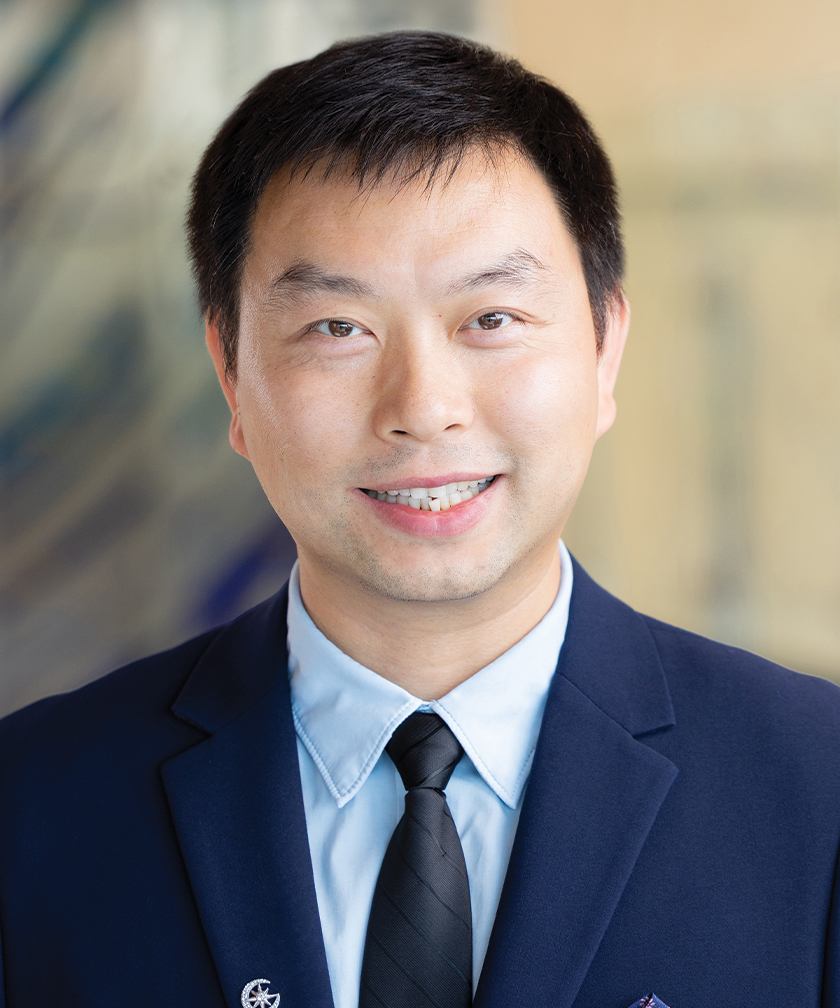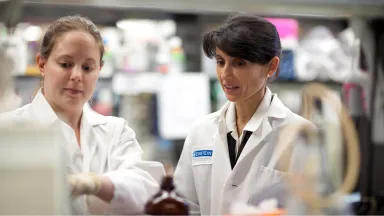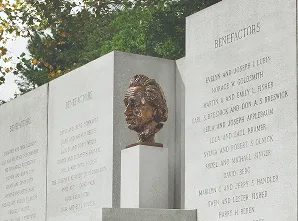
Shanye Yin, Ph.D.
- Assistant Professor, Department of Pathology
Area of research
- single-cell sequencing, spatial transcriptomics, bioinformatics, cancer
Phone
Location
- Albert Einstein College of Medicine Jack and Pearl Resnick Campus 1300 Morris Park Avenue Forchheimer Building 514A Bronx, NY 10461
Research Profiles
Professional Interests
My research interests lie at the intersection of single-cell sequencing, spatial transcriptomics, tumor heterogeneity, and computational analysis, with a specific focus on cancers, including head and neck cancer (HNSCC), chronic lymphocytic leukemia (CLL), lung cancer (NSCLC), and adult T-cell leukemia/lymphoma (ATLL).
Tumor heterogeneity is a central theme in my research. I seek to decipher the underlying mechanisms driving this diversity and its implications for disease progression and treatment response. Computational analysis plays a pivotal role in my work, enabling the integration of multi-dimensional data to predict patient outcomes and guide precision medicine approaches. Single-cell sequencing allows for the exploration of cellular diversity within tumors, offering insights into the genetic and phenotypic variations that contribute to tumor heterogeneity. Spatial transcriptomics is another transformative tool that helps us understand how gene expression patterns are distributed within tissues. My interest lies in applying this technique to map the spatial heterogeneity of tumors, shedding light on the microenvironment and interactions between cancer cells and their surroundings in these specific cancer types. I am deeply committed to leveraging this technology to unravel the complexities of different cancers, aiming to identify novel therapeutic targets and personalized treatment strategies.
Ultimately, my professional passion centers on advancing our understanding of these cancers through innovative technologies and computational methodologies, with the ultimate goal of improving patient care and outcomes.
Selected Publications
- Wu G, Fan X, Cheng L, Yi Y, Liang J, Huang X, Yang N, Yin J, Guo W, Huang Y, Yin S#. Metabolism-driven post-translational modifications and immune regulation. Science Advances. 2025 Sep 12;11(37):eadx6489.
- Xue M, An J, Hu E, Deng W, Yin S#. SF3B1K700E-driven transcriptional alterations in hematopoietic progenitors underlie blood cancer pathophysiology. Genes & Diseases. 2025 Jul 15, 101775.
- An J, Hu E, Shi Y, Fang Y, Liu N, Liu Q, Wang Q, Wang Y, He W, Wang A, Song Y, Shan J, Zhang J, Zou Y, Cheng H, Cai W, Verma AK, Sica RA, Deng W, Yin S#. Single-Cell Analysis of Oncolytic Virotherapy in Adult T-Cell Leukemia/Lymphoma. The Journal for ImmunoTherapy of Cancer. 2025 Mar 25:13-3.
- Hu E, An J, Gersten AJ, Wu N, Kawachi N, Zhu J, Rosenblatt G, Augustine S, Smith RV, Segall JE, Ostrer H, Amelio AL, Chung CH, Prystowsky MB, Ow TJ, Deng W, Yin S#. Virusplot: a web server for viral integration analysis and visualization. Front. Oncol. 2025 Feb 19:15:1539782
- Huang Y, Cheng L, Bi G, Liang J, Li M, Zhang H, Shan G, Hu Z, Chen Z, Wu G, Lin Z, Jiang W, Wang Q, Xi J, Zhan C, Yin S#. Unveiling neoadjuvant chemotherapy-induced immune landscape remodeling and metabolic reprogramming in lung adenocarcinoma by scRNA-sequencing. Elife. 2024 Dec 27:13:RP95988.
- Ye R, Wang A, Bu B, Luo P, Deng W, Zhang X, Yin S#. Viral oncogenes, viruses, and cancer: a third-generation sequencing perspective on viral integration into the human genome. Front. Oncol. 2023 Dec 20:13
- Deng W, Yin S#. Decoding the Pan-Cancer Regulatory Landscape: Insights from Proteogenomics and Post-Translational Modifications. The Innovation Life. 2023.100032.
- Yin S* ,#, Klaeger S, Chea V, Carulli I, Rachimi S, Black K, Filbin M, Hariri L, Knipe R, Carr S, Wu JC#, Kim EY#, and Keskin DB#. Integrated Immunopeptidomic and Proteomic Analysis of COVID-19 lung biopsies. Front. Immunol. 2023 Oct 20:14:1269335
- Chi B, Öztürk MM, Paraggio CL, Leonard CE, Sanita ME, Dastpak M, O'ConnellJD, Coady JA, Zhang J, Gygi SP, Lopez-Gonzalez R, Yin S, Reed R. Causal ALSgenes impact the MHC class II antigen presentation pathway. Proc Natl Acad Sci US A. 2023 Sep 26;120(39):e2305756120.
- Wang Y, Wang S, Chen D, Li M, Mi S, Xiong L, Song W, Wang W, Yin S#, Wang B#. Mitral valve aneurysms: echocardiographic characteristics, formation mechanisms, and patient outcomes. Front Cardiovasc Med. 2023 Aug 25;10:1233926.
- Ten Hacken E*, Yin S*, Redd R, Hernández Sánchez M, Clement K, Hoffmann GB,Regis FF, Witten E, Li S, Neuberg D, Pinello L, Livak KJ, Wu CJ. Loss-of-function lesions impact B-cell development and fitness but are insufficient todrive CLL in mouse models. Blood Adv. 2023 Aug 22;7(16):4514-4517.
- Ten Hacken E*, Yin S*, Hoffmann GB, Gruber M, et al. In Vivo Modelingof CLL Transformation to Richter Syndrome Reveals Convergent Evolutionary Pathsand Therapeutic Vulnerabilities. Blood Cancer Discov. 2023 Mar 1;4(2):150-169.
- Yin S, Gambe RG, Sun J, Martinez AZ, Cartun ZJ, et al. A Murine Model of Chronic Lymphocytic Leukemia Based on B Cell-Restricted Expression of Sf3b1 Mutation and Atm Deletion. Cancer Cell. 2019 Jan 14;35(2):283-296 [Cover story].
- Lazarian G*, Yin S*, Hacken E, Sewastianik T, Uduman M, A Font-Tello, et al. A hotspot mutation p.L162R in IKZF3 drives B cell neoplasia via transcriptional dysregulation. Cancer Cell. 2021 Mar 8;39(3):380-393.
- Yin S, Iocolano A, Yu Y, Gangopadhyay J, Reed R. In Vitro System for Coupling RNAP II Transcription to Primary microRNA Processing and a Three-Way System for RNAP II Transcription/Splicing/microRNA Processing. Methods Mol Biol. 2018;1823:43-50.
- Yin S, Lopez-Gonzalez R, Kunz RC, Gangopadhyay J, Borufka C, Gygi SP, Gao FB, Reed R. Evidence that C9ORF72 Dipeptide Repeat Proteins Associate with U2 snRNP to Cause Mis-splicing in ALS/FTD Patients. Cell Reports. 2017 Jun 13;19(11):2244-2256.
- Wang B*, Zhang L*, Yin S*, Deng W, Xie M. Risk factors associated with deep vein thrombosis in COVID-19 patients. MedComm. 2021.18 March.
- Deng W*, Yin S*, McMullin D, Inglessis-Azuaje I, Elmariah S, Hung J, Lo EH, Palacios IF, Buonanno FS, Ning M. Residual Shunt After Patent Foramen Ovale Closure and Long-Term Stroke Recurrence: A Prospective Cohort Study. Ann Intern Med. 2020 Jun 2;172(11):717-725.
- Ding H*, Deng W*, Ding L, Ye X, Yin S#, Huang W#. Glycyrrhetinic acid and its derivatives as potential alternative medicine to relieve symptoms in non-hospitalized COVID-19 patients. Journal of Medical Virology 2020 Jun 5: 10.1002.
- Ding H*, Yin S*, Chen Y, Huang W, Deng W. COVID-19 on the nerves: neurologic manifestations in non-hospitalized patients. MedComm. 2020:02 July.
- Yin S, Yu Y, Reed R. Primary microRNA processing is functionally coupled to RNAP II transcription in vitro. Scientific Reports. 2015 Jul 7;5:11992.
- Yin S, Yang J, Lin B, Deng W, Zhang Y, Yi X, Shi Y, Tao Y, Cai J, Wu CI, Zhao G, Hurst LD, Zhang J, Hu L, Kong X. Exome sequencing identifies frequent mutation of MLL2 in non-small cell lung carcinoma from Chinese patients. Scientific Reports. 2014 Aug 12;4:6036.
- Yin S, Wang P, Deng W, Zheng H, Hu L, Hurst LD, Kong X. Dosage compensation on the active X chromosome minimizes transcriptional noise of X-linked genes in mammals. Genome Biology. 2010;10(7):R74.





